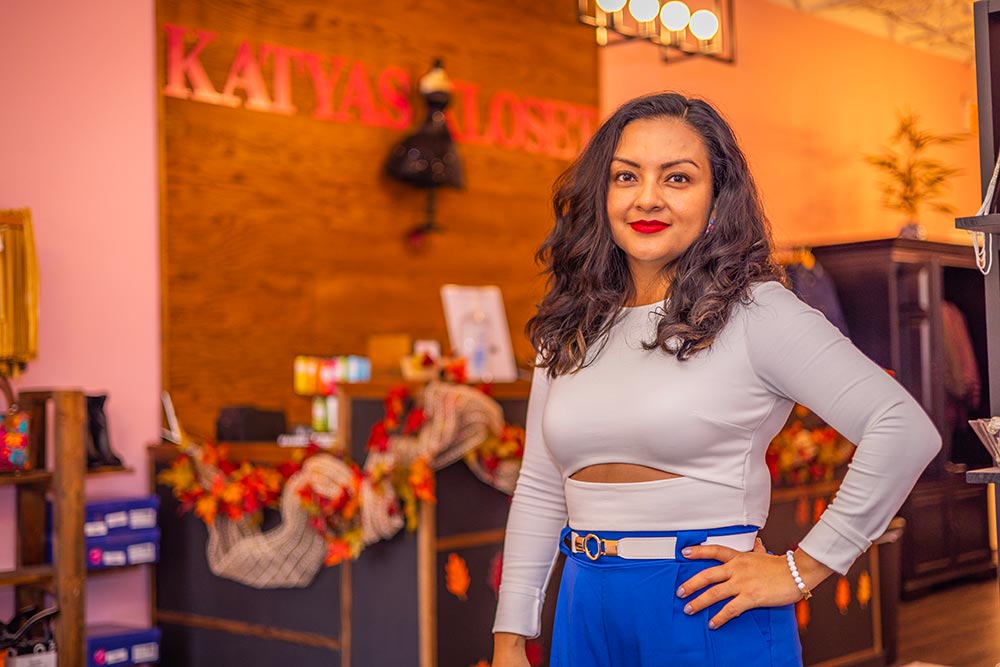
Katy Knowlin has been chasing her ideal American dream for over three decades, and this past spring, she finally saw it come true. She’d passed through other major pillars to support it — an education, a family, a house, a good job — and completed the last leg by becoming a self-employed business owner. With her rags-to-riches story finally full circle, Knowlin’s boutique, Katya’s Kloset, brings the favorite parts of her El Salvadoran and Los Angeles heritage to life here in Charleston.
Knowlin was very young when her parents left her in her grandmother’s care in El Salvador. In that era of the 1980s, her father would have been forced either to be a gangster with the guerillas or to join the military — neither was a suitable option for him, so they escaped to the United States to eke out a better life, saving every penny to bring their children with them.
“We were extremely poor. We lived in a tin house and didn’t have milk, so my grandmother would put sugar in my water,” she remembered. “El Salvador is plentiful in coffee fields, and because we were so poor, we used coffee sacks as clothing and underwear. That’s why my parents needed something better.”
Knowlin’s mother found a job as a housekeeper in Beverly Hills, and her father worked in construction.“My mother found a coyote — a smuggler — to pretend that we were his kids, and we had to trust that he would take my sister and me across the border safely. She picked a good person – we crossed the San Diego border in a car in November 1988, and that’s where my story starts,” she said.
Knowlin’s parents worked seven days a week, and her mother refused to get help from the government, which Knowlin remains proud of. Daycare wasn’t an option, so Knowlin accompanied her mother to clean houses in Beverly Hills. “It was like a dream. You see all these big houses and kids with giant dollhouses — and we lived in a shack,” she explained. “I remember knowing even then that I didn’t want to be in this predicament. You get stereotyped immediately. The Beverly Hills kids often didn’t have siblings, so they would use me to dress up while my mom was working at their houses. It was kind of cool, but I was talked down to and treated as a plaything.”
By high school, Knowlin participated in every program possible in an effort to expose herself to more than housekeeping. Though she loved her family, she wanted much more than what she knew between home, church and school. “It hit me that we have no documentation — how do I leave?”
It was around that time that she learned about the benefits of being in the U.S. Military —education without loans, an opportunity to see the world. Though she wasn’t a citizen, she was a resident, so the military allowed her to join — within a year of joining, she became a citizen.
Knowlin’s top physical shape from high school soccer helped her earn a spot as an 82nd Airborne Paratrooper jumping out of military planes. “It changed my world completely. Out of about 1,000 men, there are only about three women, so you stick it out and endure,” she said.
She met her future husband while stationed at Fort Bragg, where she enrolled in pre-med and psychology. After she became pregnant, Knowlin reconsidered her military future. “It was difficult, but I knew I had to find another way.” So she did.
Knowlin finished graduate school with a degree in health care management and information technology, transitioned from being in the Army to being a military wife and dipped her toe into the corporate world. There, she found herself on an impressive upward trajectory in technology and health care systems, eventually working in clinical research for heart failure at Duke before landing a job at MUSC running the Stroke Research Program, the Opioid Crisis Project and then taking on COVID-19 data projects.
“I was happy, but some part of me was asking, ‘OK, you’re here. You have the house, you have the kids and husband, but how do you connect to your roots and teach all that to your kids?”
She and her husband had always talked about wanting to be self-employed, but rather than health care, she wanted to go a different route — something to tie fashion and traveling back to El Salvador and Los Angeles. With that, Katya’s Kloset was born.
Bold colors and different styles are some of the highlights of her new venture, which opened this past spring. She returned from a trip to El Salvador and visited the areas she used to call home, fully embracing the culture and heritage that has blossomed and rejuvenated since her dark days in the 1980s.
“When I go into boutiques, I remember the feeling of not being able to afford things. I wanted someone to be able to come into my boutique and buy stuff and not look at the tag and run away. Then the idea came up: let’s do a fusion – El Salvador and Los Angeles styles meet Charleston. It wraps up everything I love and worked for, and I am so proud.”
By Anne Toole